When I think of America, I do not think of “the land of the free and the home of the brave.” I think of a country that is built on the 24-hour news cycle, a country that is mired by its inability to take an event and not generalize it to the world at-large. Take the Paris attack. While the country—along with the rest of the world—united in support for the victims of the latest terrorist attack, we’ve also come down harshly on an issue that shouldn’t be related: the immigration of Syrian refugees.
Twenty-seven state governors have released statements barring Syrian refugees from resettling in their state. These proclamations are ridiculous. State governments do not have the power to disallow refugees from living there. But they can still do some damage. Under the United States’ refugee policy, the State Department decides where to place refugees, who, unlike other immigrants, are not left to fend for themselves once reaching America. Instead, they are given financial support—supplied by non-profit organizations and state governments—to help them learn English, find employment and adjust to life in America. If the governors restrict these benefits, they will destroy the new lives of these refugees. And that could be catastrophic.
Dara Lind of Vox says it best: “When immigrants don’t get that support—when they have no reason to feel that they’re members of their new community, and can only rely on their fellow immigrants for support—we know what happens. That’s exactly what France and other European countries are dealing with right now with their Muslim immigrant communities: second- or third-generation immigrants who have absolutely no reason to feel French. There are a lot of reasons Europe has struggled to integrate its immigrants, but it’s certainly true that the government didn’t take an active role in integrating them when they first arrived.”
The Syrian refugees who resettled in the United States are likely not moving here to participate in any terrorism-related activities. To be accepted into the refugee program, they are scrutinized for nearly two years. But, when something like the terror attacks in Paris occur, people—and the media—decide that all Syrians, or all Muslims, must be held culpable.
In Toronto last weekend, a couple hung a sign outside their home asking Muslims if they were “sorry for the slaughter of innocent people [who] represent [their] religious beliefs.” This is ridiculous. Just because the terrorists who committed the attacks share religious beliefs with others does not mean they share any other beliefs with them. This would be equivalent to blaming all Catholics for gay bashing across history. The actions of a part of a group do not represent the actions and opinions of the whole.
But, due to something called the “availability heuristic,” humans are not always inclined to think this way. It is easier for us to take an example of something we see on the news—something easily available to us—and make a large-scale judgment based on it than to research the facts at hand. When Donald Trump claims that “in many cases [Mexican immigrants] are criminals [and] drug dealers,” he is making a general claim likely based on stereotypes or a few cases in the news. However, the Washington Post did some digging about first-generation immigrants and found that they “are predisposed to lower crime rates than native-born Americans.”
And, those like Donald Trump, who believe that our culture is too politically correct, spread their views out of a fear instilled by these generalizations. Let’s look at a topic that was all over the media last year, but has since faded: rape on college campuses. Last year, it seemed the issue would finally be taken as seriously as it needed to be by the public due to the intense media coverage of rapes at colleges such as the University of Virginia, Harvard and Columbia. However, after the case of the first ended up being a hoax, and the testimonies of the second two fell into doubt, the topic has barely been a blip on the media’s radar. Statistically, at between two and eight percent, false rape claims are highly unlikely. But, when these highly publicized cases are proven false, it creates the erroneous impression that these few cases are representative of the whole, that rape accusations are usually false.
Therefore, people must defend their perspectives more and more to ensure the public does not gain false impressions, which leads to what we know as “PC Culture.” Returning to rape culture, last year’s most feminist movie, “Gone Girl,” was criticized for showcasing a sociopathic woman who falsely accused a man of sexually assaulting her. The argument was that the film, one of the highest-grossing of the year, reinforced the stereotype that sexual assault doesn’t happen, that it’s only the product of scorned women. But, why shouldn’t we have stories that portray women in a bad light, just as we have for men? The anger around presenting controversial matters won’t stop, though, until we learn to separate the actions of one from the actions of many.
But, who knows, maybe I’m wrong. Maybe I’m being too general.
Abrams is a member of the class of 2018.




